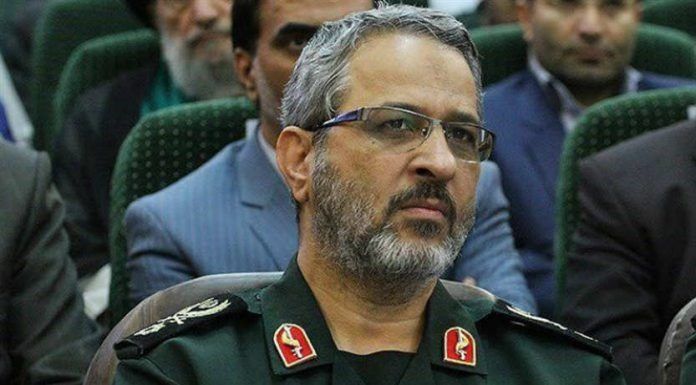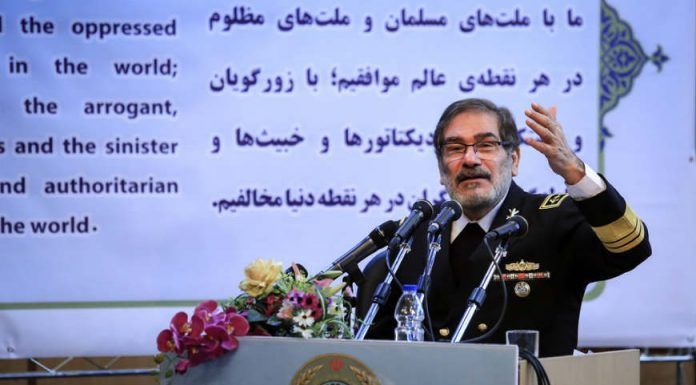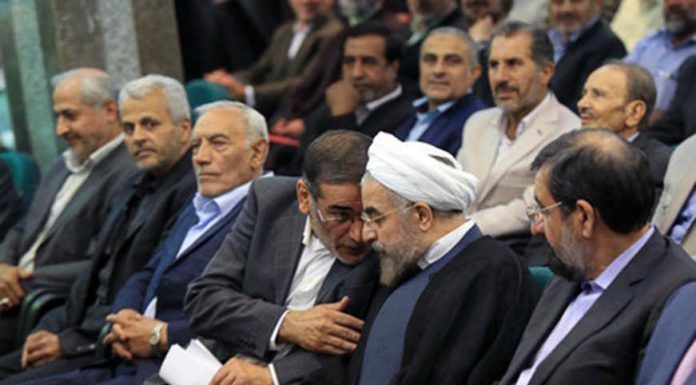During a speech at a military event on January 8, Brigadier-General Gholamhossein Gheybparvar, the head of the Basij Resistance Force, warned those pushing for a new round of talks with the U.S. not to pin their hopes on Washington, and instead to follow the Supreme Leader Ayatollah Ali Khamenei’s example in preserving the Islamic Revolution.
“There is no doubt that our economy is in bad shape. We need to rethink our entire economic philosophy and approach to financial management. But that doesn’t mean we should be knocking on the White House’s door,” Commander Gheybparvar said. “There is no shortage of religious and pious people in this country who believe in themselves and in the Islamic Republic system. We are the envy of the world. However, some Iranians doubt our capabilities and reach out to the U.S. and Europe for help. I don’t know of a single instance in recent history when America has acted with our best interests at heart.”
Mr. Gheybparvar’s thinly veiled criticism was directed at the government of President Hassan Rouhani in its apparent belief that the EU would ultimately rescue the Joint Comprehensive Plan of Action (JCPOA), better known as the Iran nuclear deal, and that reaching out to President Donald Trump might lead to the easing of the U.S. economic sanctions.
The Secretary of Iran’s Supreme National Security Council, Rear Admiral Ali Shamkhani, said on December 7 that the U.S. had tried to contact him during his visit to Afghanistan. “The Americans contacted me twice wanting to set up a meeting,” Admiral Shamkhani said. “They are lying about Iran reaching out to them.”
Admiral Shamkhani led a delegation of senior officials and commanders of the Islamic Revolutionary Guards Corps (IRGC) on a one-day visit to the Afghan capital Kabul on December 26. Brigadier-General Gholamreza Mehrabi, the deputy security and intelligence commander of the General Staff of the Armed Forces of the Islamic Republic of Iran, and Brigadier-General Esmail Ghaani, the deputy commander of the IRGC’s Qods Force (IRGC-QF), accompanied Secretary Shamkhani on his visit.
According to a recent report by Kayhan London, Italian Foreign Minister Enzo Moavero Milanesi, on his last visit to the U.S., offered to mediate in talks between Tehran and Washington. The U.S. administration’s alleged offer to open negotiations with Iran has reportedly widened the rift between regime insiders.
As the prospect of the Special Vehicle (SPV) devised by the EU to enable European companies to circumvent U.S. sanctions continues to dim, Tehran finds itself more open to the idea of engaging in direct negotiations with Washington. Foreign Minister Javad Zarif’s hope of keeping the JCPOA alive without the U.S. has been dashed by the EU’s reluctance to side with Iran against America. It is unclear which of the 12 conditions set by the U.S. Secretary of State Mike Pompeo in May for a new nuclear deal with Iran Mr. Khamenei would ultimately be willing to accept.
Senior Iranian and American diplomats conducted secret negotiations that led to the signing of the JCPOA in 2015. However, it would seem that this time around, high-ranking military officials, at least on the Iranian side, are engaging in talks.
It would seem that the initial round of talks between Admiral Shamkhani and unnamed American officials in Afghanistan has failed to yield any tangible results. Both sides are most likely entrenched and unyielding in their positions. Meanwhile, the Israeli Air Force has reduced the number of its bombing raids on IRGC positions in Syria significantly. Israeli newspapers, however, continue to report on suspicious commercial flights from Tehran to Damascus.
It should not surprise anyone if the Iranian military, particularly the IRGC forces, should start to pull out of Syria in the coming weeks and months. Iran’s military withdrawal from Syria is one of the 12 U.S. conditions that Tehran needs to meet before Washington will even consider lifting the sanctions.
The Iranian strategy seems to resemble the one used during the JCPOA negotiations. Regime insiders divide themselves into two camps; one group would assume a hardline stance against any talks with Washington, which would ultimately enable Tehran to set specific preconditions for sitting at the negotiating table, and the other group would promote a more conciliatory tone towards the U.S. to pave the way for the regime to make concessions to the West. The two-pronged approach allows Mr. Khamenei to accept America’s terms by exercising the face-saving “heroic flexibility” for the second time. The U.S. would also be able to fulfill its objective in the process.
Mr. Shamkhani was a staunch supporter of the JCPOA. He has repeatedly demonstrated his preference for dealing with the U.S. rather than with European governments. He is somewhat aggressive and at times confrontational during talks with European diplomats. Shamkhani was reportedly very hostile towards British Foreign Secretary Jeremy Hunt when the two met in Tehran in November 2018. Upon returning to London, Mr. Hunt said: If Iran has a policy of detaining dual nationals as a tool of diplomatic leverage, then there will be consequences for Iran. We will not let them get away with it scot-free. They have to understand this is not a sustainable situation.”
Iran’s military presence in Syria, its arming of the Shia militias in Iraq, its funding of the Lebanese Hezbollah, its support for the Houthi rebels in Yemen, and its alleged plots to assassinate opposition figures in Denmark and France most likely have played a role in discouraging the EU from implementing the SPV to circumvent the U.S. sanctions. It is plausible that one of the factions within the regime would hope that the deterioration of the relationship between Iran and Europe would pave the way for direct negotiations between Washington and Tehran. Mr. Shamkhani could play a crucial role in tipping the balance in favor of the camp within the regime’s inner circle that promotes direct talks with the U.S.
Translated from Persian by Fardine Hamidi




